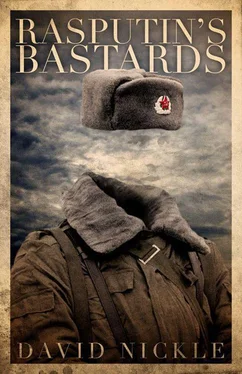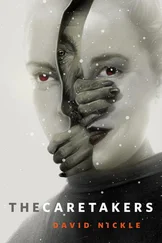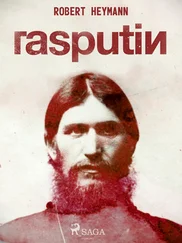David Nickle
RASPUTIN’S BASTARDS

to Olga Nickle
who dreams better dreams than anyone within these covers
“A particle of the Supreme being is incarnated in me. Only through me can you hope to be saved; and the manner of your salvation is this: you must be united with me in soul and body.”
— Grigori Yefimovich Rasputin
“All happy families are alike.”
— Leo Tolstoy
THE SPIES
ALEXEI KILODOVICH — A spy who remembered
FYODOR KOLYOKOV — A spy who loved too much
LENA — A spy who adored life
BABUSHKA — A spy who disdained death
JEAN KONTOS-WU — A diligent spy
VASILI BOROVICH — A spy who dreamed badly
THE KOLDUN — A spy who slept quietly
RICHARD[REDACTED] — A spy who broke
MILES SHUTE — A spy repurposed
ILYICH CHENKO — A spy who made his fortune in real estate
TANYA PITOVOVICH — An associate of Chenko’s; a spy who is good at it
THE AMERICANS
STEPHEN HABER — A talentless orphan
HOLDEN GIBSON — A terrible father
HEATHER[REDACTED] — A rebellious daughter
JAMES[REDACTED] — A recalcitrant son
LEO MONTASSINI — A man in who fell into mystery
GEPETTO BUCCI — His boss
THE TURKS
AMAR SHADAK — A purveyor of arms and collector of submarines
KONSTANTINE UZIMERI — A “submarine guy”
THE CHILDREN
VLADIMIR — A baby, filled with too much wisdom
ZHANNA — A girl, filled with too much love
THE VILLAGERS OF NEW POKROVSKOYE
DARYA ORLOVSKY — A shopkeeper of surpassing beauty
PAVEL ORLOVSKY — Her father, who stopped killing without regret
NIKOLAY TROLYNKA — A fisherman
MAKAR TROLYNKA — His son
The steam carried the smell of Babushka’s death like a soaked sponge. It leaked between the wooden slats of the bath house’s door, and whipped and whirled from there in thin, hot tendrils to mingle with the ice fog that had enshrouded the village of New Pokrovskoye since the early days of March.
March was an important month. It was the month that Babushka had first set down a schedule for her own death; the month the giant squid came to the harbour and presaged it all, by dying there itself.
The squid arrived sometime in the night. It thrashed and twisted underneath the translucent grey ice for hours before it died, its tentacles braiding and spreading — a woman’s long dark hair in a suicide bath.
Suicide seemed the best explanation. The squid could have dived — gone back south, and deep, into the cool dark ocean where its brethren dwelled in unguessable numbers. But something stopped it; or it knew, somehow, that its time was up. Whatever the reason, it stayed there beneath the harbour ice of New Pokrovskoye, thrashing and twisting until finally it slowed — its giant form stretching under the grey-green sheet for fifteen metres, like a great, dark stroke of watercolour.
Babushka wheeled herself out onto the ice in the predawn, breath making a contrail behind her as she huffed along to the squid’s remains. The ice creaked as she leaned forward in her wheelchair, propped on her walking stick, and glared down at the creature.
The walking stick was old. It was said that it had been carried to St. Petersburg by a holy man a hundred years ago, and was cut many years before that — and it was hard as iron. She leaned over, hacking at the ice, eventually tumbling out of her chair and falling to her knees with the effort. By this time, someone had called the Koldun — the fishing village’s lodge wizard and healer, second only to Babushka herself in esteem and influence.
He went out and joined her for a time. A growing crowd of villagers watched at the bank as he wheedled and cajoled and finally took hold of her arm. But she shook off his attempt angrily, and that was all it took. The Koldun had known Babushka for many years. But neither he nor anyone else dared confront her when she became like this.
She glared down into the squid’s eye for a full minute — then finally, drew back, barked a harsh laugh, and spat in it.
She turned to the Koldun and the rest, and that was when she said it, loud enough to carry through the whole, ice-bound village:
“When this kraken is gone — I go too.”
The Koldun and the others laughed, uncomfortably at first — and then, as she joined them, with more assurance.
And because of that, the people of New Pokrovskoye concluded:
Everything is fine. It’s just another of Babushka’s jokes.
But it was no joke.
Babushka knew the lay of her years the same as she knew the lay of this foreign and rocky earth, the hearts of the men and women who believed they controlled it, and the movements of the long, dreaming war that had long ago faded to mere skirmishes. As the ice from the waters in the north mingled with the waters to the south, so would Babushka mingle with the air.
And so Babushka reached from the bath house, and quit of her flesh, she joined the icy air swirling in the breaths of her grandchildren.
To each one, Babushka’s scent was different. Darya Orlovsky, who had suckled at the Babushka’s teat and loved her more dearly than her own mother, smelled breast milk and coffee and sausage. “Oh,” she said, as she lifted a crate of caviar from the back of the truck and turned to carry it into the store. “Babushka.”
Old Nikolay Trolynka, who was in his fishing boat as it crossed the part of the harbour where candle wax chunks of the iceberg had still floated just a day before, smelled ginger and garlic. “Ah,” he said, nodding to himself. “‘The kraken goes, and so do I.’ That explains it.”
“Heh?” said Makar, Nikolay’s oldest son. His nostrils flared around a sharper smell — of sulphur and mint — as he wheeled the fishing boat.
“Babushka,” said his younger brother Oleg, smelling old sweat not his own. “She has gone, and drawn the fish with her.”
“Makes as much sense as anything.” Makar ran his arm across his nose and snorted. It did no good; the smell remained.
It remained, and it spread — through the town store, in hues of blueberry and whiskey and pine needle; in shades of clove and musk and olive, through the rambling Museum of Family History that was the Koldun’s gift many years past; and across the fishery, where the flatulent stench of rotting cod guts was replaced by a mélange of odours — each one better or worse than fish death, depending upon the predisposition of the particular grandchild’s nose that it touched.
Babushka’s body lay still on the top bench of the bathhouse. Babushka herself rested somewhat higher, suspended above her great, still breasts, in a concentrated cloud of vapours.
The Koldun removed his coat and set it on the peg in the dressing chamber, before he pulled the door shut behind him.
So you did it , said the Koldun. His eye moved up and down, from the Babushka’s body to her essence and back again. I confess, my dear, I am puzzled. You had obviously been planning this. Yet why?
Читать дальше













